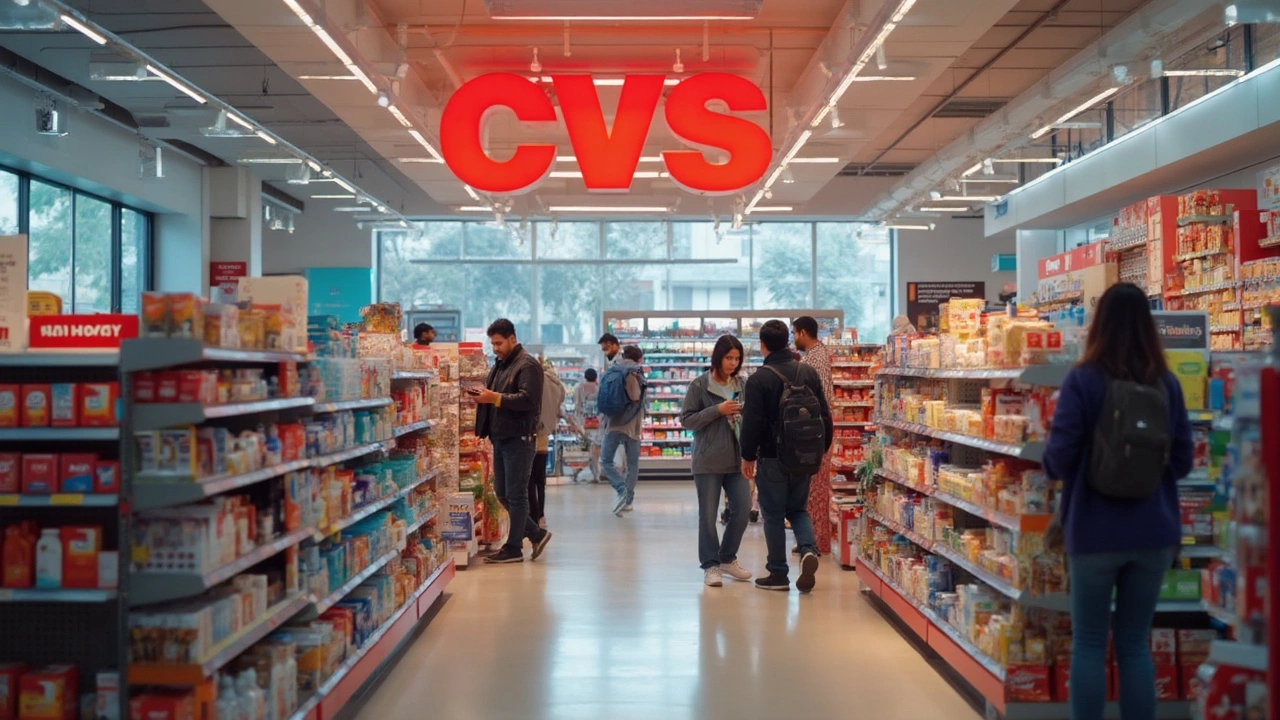
Have you ever walked into a CVS Pharmacy, picked up your prescription, and winced at the price tag? You're definitely not alone. Many people find themselves scratching their heads, wondering why on earth their medication costs an arm and a leg at CVS.
Several factors play into this. First off, let's talk about brand and convenience. CVS has a strong brand presence and thousands of locations, often in the most convenient spots. This setup means you're paying a bit more for the ease of access and the trust that comes with a big name.
But it's not just about branding. There are loads of behind-the-scenes costs as well. Running a pharmacy involves regulatory compliance, maintaining stock, employing pharmacists—none of which come cheap. All these costs are factored into the prices you pay.
Feeling stuck between a rock and a hard place? Don't worry. There are ways to snag your meds without breaking the bank. From discounts and generics to comparing prices with competitors, you might find a strategy that works for you.
- Understanding Pharmacy Pricing
- The Role of Brand and Convenience
- Behind-the-Scenes Costs
- CVS vs. Competitors
- Consumer Tips for Lower Costs
- The Future of Pharmacies
Understanding Pharmacy Pricing
Have you ever thought about why CVS prices might feel like they're going through the roof? Let's break it down!
The cost of drugs at a pharmacy isn't as straightforward as pricing your average grocery item. For starters, the price tag you see includes a lot more than just the cost of making the medication. There are distribution fees, storage requirements, and those ever-important safety and compliance measures that pharmacies have to take seriously.
Now, all of these factors are piled together with the markup that companies need to cover their own expenses, like paying their employees and keeping the store running smoothly. It's similar to how a restaurant charges more for a dish than it costs them to make; you're paying for the experience, location, and the chef's expertise too.
But what truly stands out is how pharmacy costs can fluctuate due to various market dynamics. For instance, drug manufacturers play a big role in pricing. Some meds, especially those under patents, allow manufacturers to set higher prices because there's no competition.
On the flip side, generic options can be a game changer in reducing costs. These are essentially copies of brand-name drugs but sold for less. CVS and many other pharmacies offer these as a cheaper alternative when available, which is a nice break for our wallets.
And don't forget insurance! The prices you see might be really different from what you end up paying if you've got insurance coverage. Insurers negotiate prices with pharmacies, but this also means that sometimes different plans cover different meds.
Here's a quick look at some examples:
| Drug Type | Estimated Cost Increase with Patents |
|---|---|
| Brand-Name | 50%-80% |
| Generic | 0%-10% |
Wrapping your head around all this might seem a bit much, but understanding these pricing layers helps you make better decisions and maybe even save a bit next time you're at the pharmacy.
The Role of Brand and Convenience
When it comes to the high costs at CVS Pharmacy, brand and convenience are big parts of the picture. CVS is a household name in America, synonymous with reliability and accessibility. But what does that really mean for your wallet?
First off, let's talk about brand power. Just like that shiny Apple logo on your phone can mean a higher price tag, CVS's well-established reputation allows them to charge a bit more. With that extra cost, you're essentially paying for a guarantee of quality and trust.
Next up is convenience. CVS has an impressive network of stores, with about 10,000 locations across the United States. Chances are, there's a CVS just around the corner from your home or office. This massive network means you get easy access to a pharmacy almost anywhere, anytime. But maintaining so many stores isn't cheap, and those costs find their way into product prices.
Another aspect of convenience is their 24-hour service in many locations. Being able to pick up medication at any hour adds value but also brings additional operating costs, such as staffing for night shifts, which factor into the pricing.
CVS has also ventured into online services, which have become incredibly popular. Their online platform offers prescription refills, home delivery, and health consultations. These services are super convenient but add to the overall operating expenses, influencing how much you pay.
Given all this, while it might feel like CVS is just out to pinch your pennies, they're really providing a lot of value and convenience that could be considered worth the cost. That said, if you're on a tight budget, it might be worthwhile to explore other pharmacy options and see if convenience is something you're willing or able to compromise on.
Behind-the-Scenes Costs
Okay, let's dig into some of the reasons why you might feel like you're overpaying at CVS Pharmacy. The first thing to realize is that running a pharmacy isn’t just about stocking pills and ringing them up at the register—it’s a whole operation.
Firstly, there's the hefty cost of complying with regulations. Pharmacies must adhere to strict laws regarding safety and quality, as set by agencies like the FDA. This involves regular checks and audits, which are absolutely necessary but definitely not cheap.
Next up, you've got the logistics of inventory management. Keeping a wide variety of medications in stock means large upfront costs and maintaining storage that's both safe and efficient. And, since medications can be sensitive, expired stock needs to be discarded, which adds to wastage and costs.
Another major factor is staffing. Competent pharmacists, technicians, and customer service staff form the backbone of any pharmacy operation. These folks are often well-educated and require ongoing training, which reflects in their salaries. CVS hires around 300,000 people for all these roles combined, which certainly impacts their pricing.
And let's not forget about the tech aspect. The systems in place for managing prescriptions are high-end and regularly updated to ensure user privacy and efficient service, which adds another layer of cost.
It's a mix of all these factors—from regulation and inventory to staffing and tech—that can make those prices feel sky-high. Understanding this might not make paying easier, but it can certainly help you know where your money is going.

CVS vs. Competitors
When talking about why CVS prices seem so high, it's crucial to look at how they stack up against their competitors. CVS is one of the biggest names out there, but they’re not playing solo in the big league. You've got other big shots like Walgreens, Rite Aid, and even Walmart and online pharmacies like Amazon Pharmacy stepping into the game.
Let’s break it down. CVS, much like Walgreens, prioritizes convenience—sometimes at the cost of your wallet. They both have similar business models with lots of physical stores everywhere you can think of, ensuring you're never too far away from a pharmacy. This expansive network can drive up operating costs, which trickle down to you in the form of higher prices.
In contrast, Walmart leverages its broad retail infrastructure to offer prescriptions at lower prices. You might not find a ton of Walmart pharmacies in urban centers, but when it comes to cost-cutting, they're tough to beat. Amazon Pharmacy throws another wrench into the traditional model, often providing cheaper options through online sales and delivery right at your doorstep.
Let's talk numbers for a sec. Say you're getting a generic medication—something simple like Metformin. At CVS, you could be looking at paying between $10-$20 if you're uninsured. Same deal at Walgreens. But wander over to Walmart, and you might find it for closer to $4. Amazon might shave off a few bucks with some subscription perks.
What can you do knowing all this? Don't just settle. Check different platforms for price match guarantees or discounts. And remember, sometimes grabbing that cheaper deal requires weighing the value of convenience vs. cost-effectiveness.
Consumer Tips for Lower Costs
Ever feel like CVS prices are just too much for your wallet? You’re not alone, but there are smart moves you can make to save some cash while getting the meds you need.
First up, make use of those prescription discount cards. Sounds simple, but these cards can really slash the cost of medications, sometimes by up to 80%. Just check online for some legit options.
You might also want to switch things up with generic meds. They’re just as effective as brand-name drugs but way cheaper. Don’t be shy to ask your doc or pharmacist if there’s a generic alternative for your prescription.
Frequent flyer at CVS? Then you should know about the CVS ExtraCare program. It's packed with deals and rewards for regulars. This loyalty program can help you snag discounts on both prescriptions and everyday items.
If online shopping is your thing, the CVS online pharmacy often runs exclusive deals not available in-store. Keep an eye out for those and order in bulk if you can—it usually costs less per dose.
Lastly, don’t underestimate price comparison. Check out prices at competitors like Walgreens or Publix. It might take a bit of extra time, but finding a similar drug at a lower cost somewhere else could make a huge difference.
Some folks have even found success by reaching out directly to drug manufacturers for assistance programs, which could mean serious savings if you qualify.
With these tips, you'll be better equipped to navigate the sometimes daunting world of pharmacy pricing. Your health shouldn't break the bank, and with a little effort, it won't have to.
The Future of Pharmacies
The world of pharmacies is changing fast, and it's shaping up to be something quite different from what we're used to. With technology advancing at rocket speed, online pharmacies are becoming a huge deal. Ever ordered something online and marveled at the convenience? That's exactly what people are loving about online pharmacies.
For starters, online pharmacy options are making it easier for folks to get their hands on prescriptions without leaving their homes. This is especially great for those with limited mobility or tight schedules. As telemedicine is on the rise, so too are online prescription services. You can have a virtual consultation with your doctor and get your meds delivered straight to your door. It’s as simple as ordering a pizza!
Plus, there’s the use of Artificial Intelligence (AI) in medication management. Imagine an AI that reminds you to take your pills or even suggests when you should refill a prescription. Pharmacies are getting smarter, making life a bit easier for everyone.
Then there’s the pricing aspect. With increased competition from online retailers, traditional players like CVS need to innovate to stay in the game. Personalized deals, mobile apps, and subscription services are some of the tools they're using to keep CVS Pharmacy competitive and appealing.
And let’s not forget about the potential of drone deliveries. Who wouldn’t want to see their meds arrive via a high-tech flying gadget? While it sounds like science fiction, it’s a real possibility for the future.
It’s not just about tech changes, though. Pharmacies are placing more emphasis on customer experience. Expect more patient counseling and health services within the pharmacy itself, positioning them not just as a place to pick up medicine but as health hubs.
So, the future of pharmacies like CVS, as we see it, will be all about embracing technology, improving access, and enhancing the customer experience. It’s definitely an exciting time for people who rely on these services!

Write a comment